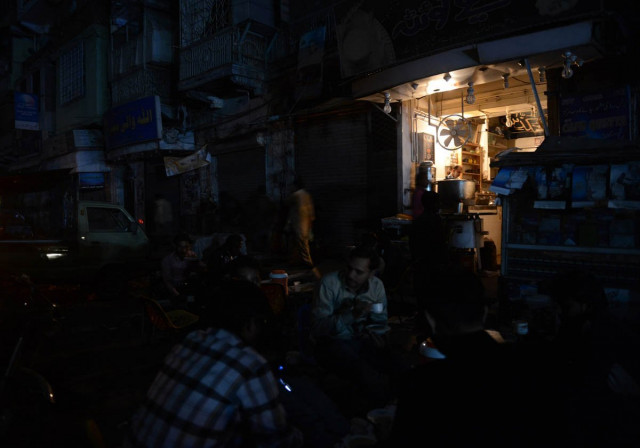Power outages continue — and so do excuses
With fuel shortage addressed, KE attributes load-shedding to KANUPP shortfall

Despite the government taking measures to address K-Electric's (KE's) complaints of fuel shortage and increasing gas supply to it by 50mmcfd, the utility company continues to fail to meet Karachi's electricity demands as the city sizzles in hot weather.
The situation worsened on Friday night when almost half the port city plunged into darkness.
Earlier, KE had ascribed prolonged load-shedding in the city, peaking to 15 hours a day, to a shortage of furnace oil and gas. With that problem being addressed, the power utility now attributes long hours of power outages to a shortfall of merely 60 megawatts from the Karachi Nuclear Power Plant.
On the other hand, sources in KE, who asked not to be named, claimed that the utility is unable to ensure uninterrupted power supply as it continues to solely rely on cheap fuel for electricity generation. According to them, KE relies on subsidised electricity and grid stations for power generation and is so influential that neither the federal nor the provincial governments are able to hold it accountable.
The areas worst hit by daily load-shedding include Korangi, Landhi, Malir, Surjani Town, Liaquatabad and Gulshan-e-Maymar, among others. While these localities experience 12 to 15 hours of load-shedding every day, neighbourhoods declared exempt from load-shedding are now witnessing hour-long power cuts after every four hours.
Moreover, the suspension of electricity supply to pumping stations has given rise to a water shortage in the city.
Meanwhile, Sindh Governor Imran Ismail and several MPAs held a meeting with KE representatives at the Governor House on Friday to address Karachi's worsening power crisis, with Federal Power Minister Omar Ayub joining them via video-link.
Addressing the meeting, Ismail said ensuring electricity supply to all areas of the metropolis was KE's responsibility and no negligence on its part would be tolerated.
He pointed out the KE had earlier pledged to end excessive load-shedding in the city within 48 hours but failed to live up to its words.
Ayub, meanwhile, said that power supply from the national grid to KE had been increased from 650MW to 800MW, while gas supply was also boosted. The utility now needed to ensure that it met the city's electricity demand, he stressed.
MPAs in the meeting also criticised KE for burdening Karachi's residents with inflated bills, insisting that it did not deserve an increase in tariffs. They sought KE's financial records for the past 10 years and called for bringing it under the National Electric Power Regulatory Authority.
Published in The Express Tribune, July 4th, 2020.



















COMMENTS
Comments are moderated and generally will be posted if they are on-topic and not abusive.
For more information, please see our Comments FAQ